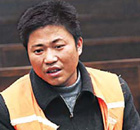Liang Hongfu
Rolling back Shanghai's confidence
By Hong Liang (China Daily)
Updated: 2009-12-25 07:13
 |
Large Medium Small |
Playing host to the World Expo in May 2010, Shanghai is coming of age.?
Never mind the white-washing projects that have turned the city into one giant construction site, or the avalanche of publicity in the local media surrounding the event. What matters is the fundamental shift in the city psyche from that of a nervous upstart, embarrassed about its past, to one that is full of confidence about the future, and feel justly proud of its former glory.
Shanghai is ready for the 2010 World Expo, or any other world event, not so much because of the copious amount of money its government throws into erecting new monuments, dolling up old buildings and repaving the roads, but rather the quality of the people who are feeling more at ease with themselves than those in many other mainland cities. Once again, the people of Shanghai have re-ignited the all-embracing spirit of the pre-World War II years, characterized by boldness, inquisitiveness and, above all, tolerance.
Unsurprisingly, all things 1930s have become fashionable. Many bars and restaurants in the city's up-market entertainment districts are advertising their 1930s' dcor to woo customers. 1933 is the name of an arts and entertainment complex housed in a remodeled slaughter-house built that year. In another part of town, on fashionable Maoming Road off the Huaihai Road commercial stripe, is 1930, a popular bar that is said to have best recreated the ambience of the caf favored by Shanghai's intellectuals in that period.
Indeed, Shanghai people have shed all inhibitions in talking about their colonial past, which, until recently, was deemed to be better left interred in the heap of history. A special TV program on the rehabilitation of Suzhou Creek, a murky tributary of the Huangpu River, mentions, among other things, the legacy of Victor Sassoon, who made his fortune initially in the opium trade. Most prominent of his legacies is the Peace Hotel, which is under extensive renovation for the Expo.
Many imposing mansions in the French and British concessions that used to be the residences of famous financiers, industrialists, property tycoons and movie moguls, as well as those infamous drug traffickers, warlords, gangsters bosses, corrupt politicians and colonial robber barons have been turned into star hotels and posh restaurants that are the favorite haunts of the city's socialites. Stories of the exploits of those swashbuckling adventurers of the colonial era are told and retold to an avid audience on TV, the Internet and in print.
In his popular talk show, Qian Wenzhong, scholar and television celebrity, urged his fans to venture out into the streets of Shanghai on which, he said, every old building holds a story waiting to be discovered. I actually followed his advice and did some research on a few old mansions that struck my fancy. The trove of information on the Internet indicates that there is wide public interest in the old buildings which continue to stand testimony to the glamour of that period.
Such interests have, for some inexplicable reasons, led to the rise in popularity of the late Eileen Chang, the Hong Kong-educated Shanghai writer, whose decadent lifestyle in her home city during the Japanese occupation is tenderly reflected in the novels she wrote. Maybe her writings are treasured as the swan song of a fabled time, which has never ceased to be a source of inspiration for the people in this romantic city by the slow-flowing Huangpu.
E-mail: jamesleung@chinadaily.com.cn









